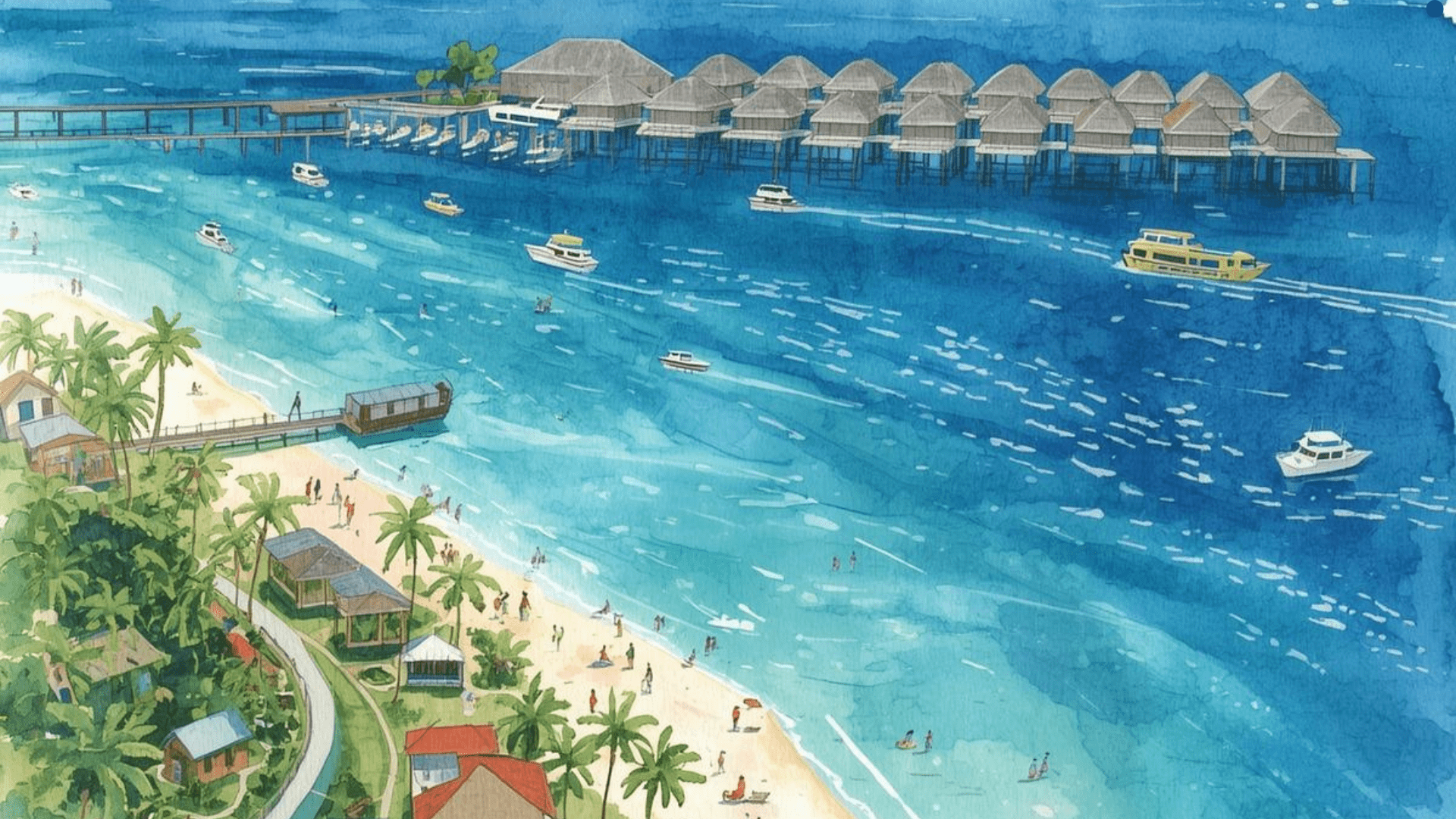When most people hear “Maldives”, they picture private water villas, champagne breakfasts, and Instagram-perfect floating breakfasts that cost more than your rent.
But here’s the secret: you don’t need a trust fund to enjoy the Maldives.
I planned a 5-day trip with my friend Laura and spent roughly £53 (~$65-70) per day—yes, including food, accommodation, and local travel. It was magical, not manicured luxury—but authentic, beautiful, and surprisingly affordable.
So, here’s my full guide—facts, figures, funny blunders, and all—on how you can plan your own budget-friendly Maldivian getaway.
Step 1: Choose the Right Island (It Makes or Breaks Your Budget)
When planning a trip to the Maldives, the first question shouldn’t be “how much will it cost?”—it should be “which island are we staying on?”
Local Islands vs. Resort Islands
The Maldives has two types of islands:
Resort islands, where each island = one resort = one big dent in your wallet.
Local islands, where locals live, eat, and operate guesthouses.
We chose Gulhi, a small local island just 30 minutes from Malé by speedboat. It was perfect—affordable hotels, cute cafés, turquoise beaches, and friendly locals who didn’t care that I looked like a sunburned lobster by day two.
Fact Check: Staying on a local island can cost 70% less than a resort stay.
While resorts easily start at $300–$1000 per night, local guesthouses range from $40–$80 per night, often with breakfast included.
👉 Compare affordable guesthouses on Booking.com or Trip.com.
Step 2: Accommodation – Cozy Overwater Dreams on a Budget
Let’s clear this up—you can find charming places to stay without maxing your credit card.
We booked a twin room with breakfast for around £40/night on Gulhi. The room had air conditioning, Wi-Fi, and a short walk to the beach (okay, technically everything was a short walk—it’s a tiny island).
In Malé, we spent a night at Marukab Plaza, which cost around £117, plus a surprise £30 in local taxes. Yes, taxes pop up like uninvited guests at a party, so always check for “environmental fees” and “tourist taxes” when booking.
Pro Tip: Even if you prepay online, there’s often an extra US$3–$6 per person per night in environmental fees.
So, plan for it, and keep a little buffer for these small—but certain—add-ons.
You can also compare options on Booking.com Deals Page or Skyscanner Hotels.
Step 3: Food & Drinks – Eat Like a Local, Save Like a Pro
If you’ve ever bought a $25 smoothie at a resort, you’ll love this part.
On local islands, food is delicious, hearty, and cheap.
We ate grilled fish, Maldivian curries, and local snacks called “hedhikaa” (think spicy mini donuts of joy). At local cafés, a full meal plus drink cost £7–8 per person.
In Malé, a shawarma + drink combo was under £5, while fancy Thai food could go up to £20+. So, you can easily balance comfort with savings.
And hydration? A bottle of water was under £1, and fresh coconuts were £3.50—which felt like a fair trade for drinking straight from nature’s bottle.
My Tip: Bring reusable water bottles and refill them where you can. The Maldives takes sustainability seriously, and avoiding plastic bottles keeps both your wallet and the environment happy.
🚤 For transfers and flights, check Trip.com Airport Transfers and Trip.com Flights.
Trip.com flight widget:
Step 4: Getting Around – Ferries, Speedboats, and Island Hopping on a Budget
Transport is where your budget can sink—or float.
We used speedboats between Malé and Gulhi, paying around $25 per person (one way). It took just 20 minutes, fast and scenic—think ocean breeze meets hair disaster.
But here’s what I learned later: Government ferries cost barely $2–$5, though they run on strict schedules (and forget about them on Fridays—it’s their rest day).
Pro Tip: Always check ferry timings before booking your flight. Missing the last ferry of the day means an unplanned night in Malé—which isn’t cheap.
✈️ Compare flight prices on Skyscanner or Kiwi.com.
Skyscanner flight search widget:
Step 5: Budget Smart – Currency, Cash, and Hidden Fees
The Maldivian Rufiyaa (MVR) is the official currency, but US Dollars are widely accepted—especially at hotels and tourist shops.
However, local cafés, ferries, and corner stores often prefer Rufiyaa. So it’s smart to exchange a small amount at the airport or in Malé.
ATMs exist, but fees can be high, and sometimes they just… don’t work (trust me, watching the “transaction failed” screen while sweating at 35°C is not fun).
And remember those extra fees: environmental, service charge, and tax. Together, they can add up to 12–18% of your hotel bill—so always read the fine print.
👉 Related: Maldives for First-Time Visitors: Everything You Need to Know
👉 See also: How to Find Cheap Flights to the Maldives: Travel Hacks for 2025
Step 6: My Daily Budget Breakdown (Real Numbers)
Here’s how much I actually spent, based on a 5-day trip (2 people sharing):
Category Cost per Person (Approx) Notes
Accommodation £30–40 Local guesthouse with breakfast
Food & Drinks £8–20 Depending on meals & snacks
Transport £5–25 Ferries/speedboats
Misc. & Fees £5–10 Taxes, coconuts, water, etc.
Average Daily Total: ~ £53 (~$65–70) per person
If you stick to ferries and avoid multiple islands, you could get it down to £40/day, but comfort might take a small dip.
Step 7: 5-Day Sample Itinerary (Budget-Friendly)
Day 1: Arrive in Malé, rest, explore the city’s local market and waterfront.
Day 2: Take a ferry/speedboat to Gulhi. Chill at the beach, swim, eat local.
Day 3: Snorkeling day! Rent gear or take a local trip (~$20–30).
Day 4: Relax, try local food, maybe buy souvenirs.
Day 5: Ferry back to Malé, catch your flight home.
You’ll have sun, saltwater, serenity—and still money left for a decent post-trip dinner back home.
🎟️ Book local ferry and bus tickets via Omio.
Bonus Tips to Save More
Travel Off-Season: May to October sees lower prices (though occasional rain).
Book Early: Guesthouses fill up fast; early bookings can save 20–30%.
Avoid Alcohol: On local islands, it’s not allowed. Resorts are your only option, and drinks are pricey.
Pack Essentials: Sunscreen, snorkel mask, and beachwear are expensive locally.
Limit Island Hopping: Each transfer adds cost and eats into your beach time.
Final Thoughts: The Real Beauty of a Budget Trip
Here’s the thing: the Maldives isn’t just for honeymooners and influencers.
It’s for dreamers who want to dip their toes in turquoise water and still have money for breakfast next week.
Traveling the Maldives on a budget doesn’t mean missing out—it means getting closer to its real charm: friendly locals, quiet beaches, and the rhythm of island life.
So go ahead—start planning, book that guesthouse, and take that ferry ride across the bluest water you’ll ever see.
Trust me, you’ll return richer—in memories, not expenses.Sure! Here are 5 detailed FAQs for your blog “How to Plan a Budget Trip to the Maldives” — written in the same conversational, friendly tone, with useful facts and figures 👇
Your Questions About a Budget Trip to the Maldives Answered
Is it really possible to visit the Maldives on a budget?
Absolutely! The Maldives isn’t just for luxury travelers anymore. Thanks to local islands like Maafushi, Gulhi, and Thulusdhoo, you can easily enjoy paradise without draining your bank account. A realistic budget for backpackers or budget travelers is around $60–$80 per day, covering accommodation, food, and transport. Stay in guesthouses instead of resorts, eat at local cafés, and use public ferries instead of private speedboats — and you’ll be amazed how affordable it gets.
What’s the cheapest time of year to visit the Maldives?
If you want sunshine and savings, travel between May and October — the “low season.”
This is the southwest monsoon period, meaning you might see short rain showers, but hotel rates drop by up to 40–50%, and flights are cheaper too.
The dry season (November–April) is the most expensive, with prices soaring during December holidays. So, unless you’re secretly a millionaire (in which case, why are you reading a budget guide?), go for the shoulder season instead.
How do I get around the Maldives cheaply?
The golden rule: use local ferries whenever possible.
Government ferries cost between $2–$5 per ride between nearby islands, compared to private speedboats that can cost $25–$100 per person for the same route.
You can check ferry schedules on the MTCC (Maldives Transport and Contracting Company) website or at local ticket counters. Just remember, no ferries operate on Fridays — the islands’ holy day — so plan accordingly.
How much should I budget for a 5-day Maldives trip?
Here’s a quick snapshot based on real numbers from my trip:
Expense Type Estimated Cost (Per Person)
Flights (round trip) $300–$500 (from Asia) / $700+ (from Europe/US)
Accommodation (guesthouse) $40–$80 per night
Food & Drinks $10–$20 per day
Transport (ferries/speedboats) $5–$25 per trip
Activities / Misc. $30–$50 total
Estimated Total for 5 days: around $400–$600, depending on how much you move around and where you stay.
Can I swim, snorkel, and enjoy beaches on local islands?
Yes, 100%! Local islands have “bikini beaches” — designated areas where tourists can swim and sunbathe freely in swimwear. The water is just as stunning as at the luxury resorts (trust me, turquoise is turquoise anywhere).
Snorkeling gear can be rented for $5–$10/day, or you can join small local tours for around $20–$40 that include coral reef visits and dolphin watching.
Pro Tip: Bring your own snorkel mask if possible — cleaner, cheaper, and you’ll get more beach time without waiting on rentals.



1 comment
whoah this blog is wonderful i love reading your posts. Keep up the good work! You know, lots of people are hunting around for this information, you could aid them greatly.